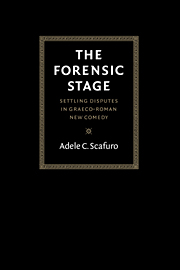Book contents
- Frontmatter
- Contents
- Preface
- Author's note on terminology, transliteration, translation, and texts
- List of abbreviations
- Introduction
- PART I PRE-TRIAL PLAYS
- PART II RECONCILIATION AND ITS RHETORIC
- 3 Arbitration and reconciliation in Athens and Rome
- 4 Scenarios of arbitration and reconciliation in New Comedy
- 5 Redress for sexual offenses in Athenian and Roman law
- 6 The resolution of seduction and rape in New Comedy
- 7 Arguing behind closed doors
- PART III PLAYING ON THE BOUNDARIES OF THE LAW
- APPENDICES
- Works cited
- General index
- Index locorum
3 - Arbitration and reconciliation in Athens and Rome
Published online by Cambridge University Press: 03 March 2010
- Frontmatter
- Contents
- Preface
- Author's note on terminology, transliteration, translation, and texts
- List of abbreviations
- Introduction
- PART I PRE-TRIAL PLAYS
- PART II RECONCILIATION AND ITS RHETORIC
- 3 Arbitration and reconciliation in Athens and Rome
- 4 Scenarios of arbitration and reconciliation in New Comedy
- 5 Redress for sexual offenses in Athenian and Roman law
- 6 The resolution of seduction and rape in New Comedy
- 7 Arguing behind closed doors
- PART III PLAYING ON THE BOUNDARIES OF THE LAW
- APPENDICES
- Works cited
- General index
- Index locorum
Summary
Arbitration and reconciliation are the most common procedural scenarios of dispute settlement in the comic genre. Sometimes they have a decidedly formal legal cast; more often, they appear as informal reconciliations between friends or adversaries. But formal or informal as they may be, the characters who take part in them have roles that would be recognizable to an Athenian audience. Except perhaps for the rather grand arbitration of Epitrepontes (literally “men who refer their dispute to arbitration”) and the preparations for one in Rudens (“Rope,” based on a Diphilan original, the title of which is unknown), scenarios of arbitration and reconciliation have not usually been noticed by interpreters of New Comedy. Moreover, legal historians have devoted little attention to these procedures in the last fifty years. The aims of this chapter are to create an Attic typology for them and to trace out what can be known about private arbitration in Rome of the middle Republic. In the next chapter, I examine arbitration in New Comedy. I have reserved the reconciliations of rape and adultery as the subject of chapters 5 and 6, and a consideration of the arguments used during reconciliations as the subject of chapter 7.
PRIVATE ARBITRATION IN ATHENS
(a) Differences between arbitration and reconciliation in the orators: a traditional and untraditional view
Private arbitration and reconciliation were probably means of settling disputes in Athens long before we have any written record of their existence.
- Type
- Chapter
- Information
- The Forensic StageSettling Disputes in Graeco-Roman New Comedy, pp. 117 - 153Publisher: Cambridge University PressPrint publication year: 1997



